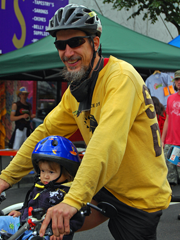
Tyee Interview »
Kathryn Gretsinger interviews Dave Olsen about the reasons for making transit free.
Subscribe: iTunes | More Tyee podcasts
We are proud today to present this timely and provocative series made possible by your donations to The Tyee's Fellowship Fund for Investigative and Solutions-oriented Reporting.
Dave Olsen is not shy about his advocacy for bicyclists and sustainable transportation. As one newspaper wrote about him, Olsen "carpet-bombs city bureaucrats with e-mails (and copies correspondence to media) about anything from dangerous crosswalks and potholes to fences blocking off downtown cycle paths during Canada Line construction. If a pothole wrecked your morning commute, chances are Olsen has already made some city engineer's life hell over it."
Olsen grew up in North Delta and has seen the region sprawl while growing ever more reliant on the automobile. He often wondered why passengers were forced to fork over handfuls of change every time they boarded a bus, or to pay escalating costs for transit passes. Other social goods, from schools to health care to the road system, are funded by the broader public through taxes, and daily use is free of charge. Why not the same for public transit, especially since charging for it tends to penalize the poorest in society, and encourage polluting behaviour?
His desire to explore the practicalities peaked in the past year for a couple of reasons. One, he received a $5,000 Tyee Fellowship for Solutions Reporting to explore the issue. And two, as he says, "there was a radical shift in North Americans' consciousness about global warming."
Shifting assumptions
The project took him to Washington State for a look at a successful fare-free transit system, and all over the Internet and libraries in search of information about the pros and cons of offering the public a free ride. The outcome is this five-part series, which he says gives him hope for change. "The examples shown here are irrefutable and wholly applicable to B.C."
Writing about public issues is high on Olsen's list, but not his first priority. "Being the best father to my daughter" is number one, he says. Olsen also provides ethical environmental consulting. In all those roles, he hopes the series will jump-start a much needed conversation. Indeed, Tyee fellowships are intended to promote independent journalism that educates the public about important issues facing British Columbia.
Olsen says it will take an engaged citizenry to help officials take seriously the potential benefits of fare-free transit. When he raised the idea with transit bureaucrats in B.C., Olsen says, "They couldn't even get their heads around it. Didn't even want to talk about it." But when he floated the same idea with bus drivers and riders, the response tended to be open and even enthusiastic.
Olsen says the time is ripe for that discussion to take off. Making public transit free for everyone to ride "is no longer only a social justice issue, an equity issue, or an efficiency issue," Olsen says. "Now it's a survival issue."
Important projects
Previously The Tyee published the prescient and much cited series "Rough Weather Ahead: How Global Warming Will Hit BC," written by Chris Wood, recipient of a Tyee Fellowship for Investigative Reporting. We also published "Reconciling with First Nations: How the 'New Relationship' is faring in the Fraser Valley," an in-depth series by Sandra Shields funded by a Tyee Fellowship for Solutions-oriented Reporting. Another reader-funded investigative series is slated to appear in the near future, and journalists will be invited to submit new proposals in the months ahead.
If you are interested in making a tax-deductible donation to The Tyee's Fellowship Funds, please read this.
Read more: Podcasts
















Tyee Commenting Guidelines
Comments that violate guidelines risk being deleted, and violations may result in a temporary or permanent user ban. Maintain the spirit of good conversation to stay in the discussion.
*Please note The Tyee is not a forum for spreading misinformation about COVID-19, denying its existence or minimizing its risk to public health.
Do:
Do not: